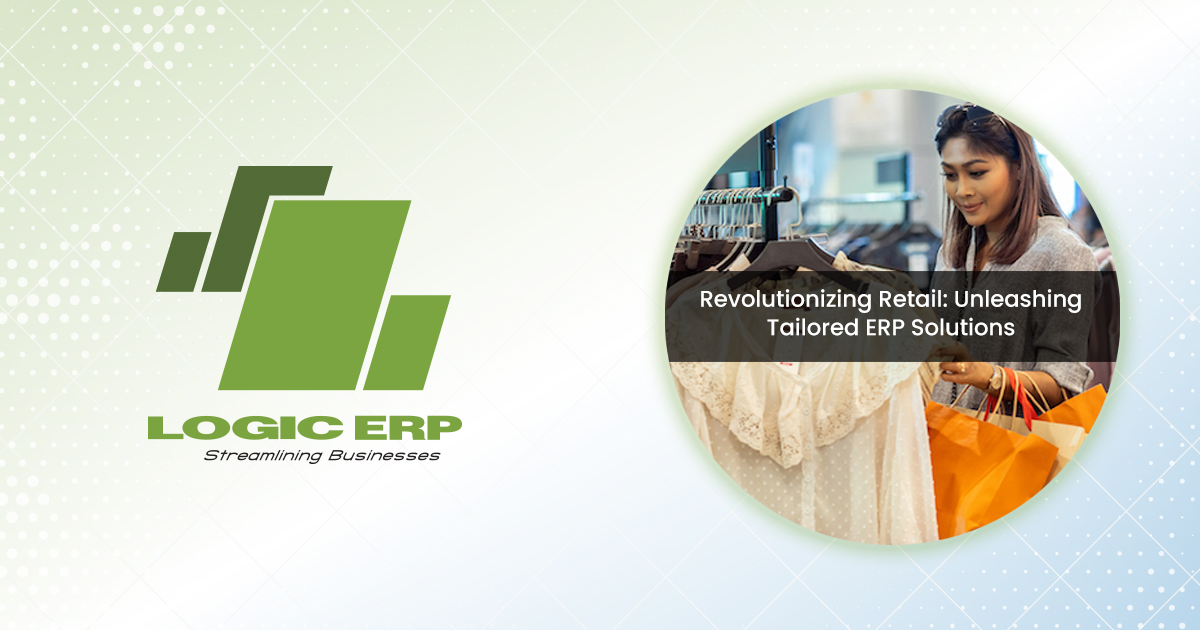

In the fast-paced world of retail, businesses constantly seek innovative strategies to stay ahead of the curve. One such avenue for transformation is through the adoption of tailored Enterprise Resource Planning (ERP) solutions. Among the myriad of options available, ERP solutions stand out as game-changers, offering comprehensive retail software solutions designed to optimize operations, enhance customer experiences, and drive profitability. In this blog, we delve into the transformative potential and how it is revolutionizing the retail landscape.
Understanding the Retail Landscape
Retail is not just about selling products anymore; it’s about delivering exceptional experiences that resonate with today’s discerning consumers. From brick-and-mortar stores to e-commerce platforms, retailers face multifaceted challenges in managing inventory, streamlining operations, and meeting evolving customer expectations. Traditional methods of managing retail operations are no longer sufficient in this dynamic environment. Retailers need agile and integrated solutions to thrive in the digital age.
The Role of Retail Management Software
Enter retail management software, the cornerstone of modern retail operations. These sophisticated platforms enable businesses to centralize and automate critical processes such as inventory management, sales tracking, customer relationship management, and financial reporting. By leveraging real-time data insights, retailers can make informed decisions, optimize supply chain management, and personalize marketing efforts to drive sales.
Tailored Solutions for Modern Retail
Empowering businesses with tailor-made ERP solutions crafted specifically for the retail sector. With years of industry expertise and a deep understanding of retail workflows, tailored ERP solutions offer a suite of features designed to address the unique challenges faced by retailers of all sizes.
- Streamlined Inventory Management
Efficient inventory management lies at the heart of retail success. A robust inventory management module enables retailers to monitor stock levels in real-time, track inventory movement across multiple locations, and automate replenishment processes. With features such as barcode scanning and batch tracking, businesses can ensure accuracy and efficiency in inventory handling, minimizing stockouts and overstock situations.
- Integrated Point-of-Sale (POS) System
Seamless transactions are essential for delivering superior customer experiences. An integrated POS system facilitates smooth and secure transactions, whether in-store or online. From processing payments to managing discounts and promotions, retailers can streamline checkout processes and enhance customer satisfaction. The integration of POS data with the ERP system provides valuable insights into sales trends, customer preferences, and overall business performance.
- Omnichannel Capabilities
In today’s omnichannel retail landscape, consistency is key. ERP solutions enable retailers to seamlessly integrate their online and offline channels, providing customers with a unified shopping experience across multiple touchpoints. Whether browsing products online, visiting a physical store, or engaging with the brand on social media, customers can expect a cohesive and personalized journey at every stage of the buying process.
- Advanced Analytics and Reporting
Data-driven decision-making is paramount in retail success. ERP empowers retailers with advanced analytics and reporting tools that deliver actionable insights into sales performance, inventory turnover, customer behavior, and more. By leveraging predictive analytics and business intelligence capabilities, retailers can identify trends, anticipate demand, and optimize pricing strategies to maximize profitability.
- Scalability and Customization
As retail businesses grow and evolve, they need scalable solutions that can adapt to changing needs. Tailored ERP solutions offer flexible and customizable software architecture that can accommodate the unique requirements of each business.
The Impact of Logic ERP on Retail Success
The adoption of ERP has far-reaching implications for retail businesses, driving tangible outcomes across various facets of operations and customer engagement.
- Enhanced Operational Efficiency
By streamlining processes and automating routine tasks, tailored ERP solutions enable retailers to operate more efficiently and cost-effectively. With centralized data management and real-time synchronization, businesses can eliminate manual errors, reduce administrative overheads, and optimize resource allocation for maximum productivity.
- Improved Customer Experiences
In today’s competitive market, customer experience is the ultimate differentiator. ERP solutions empower retailers to deliver personalized experiences that resonate with customers on a deeper level. Whether through targeted promotions, personalized recommendations, or seamless interactions across channels, retailers can foster loyalty and drive repeat purchases, ultimately increasing customer lifetime value.
- Increased Profitability
At the end of the day, profitability is the bottom line for retail businesses. ERP solutions equip retailers with the tools and insights needed to drive revenue growth and maximize profitability. By optimizing inventory management, pricing strategies, and operational efficiency, businesses can enhance margins and capitalize on market opportunities, ensuring long-term sustainability and success.
Conclusion: Embracing the Future of Retail with LogicERP
In conclusion, the retail landscape is undergoing a profound transformation, driven by digitalization, changing consumer behavior, and increasing competition. To thrive in this dynamic environment, retailers need agile and integrated solutions that can adapt to evolving needs and deliver exceptional experiences at every touchpoint. LOGIC ERP solutions emerge as catalysts for retail success, offering solutions that empower businesses to optimize operations, enhance customer engagement, and drive profitability in the digital age. By embracing ERP solutions, retailers can unlock the full potential of their business and revolutionize the way they operate in the retail landscape of tomorrow.

